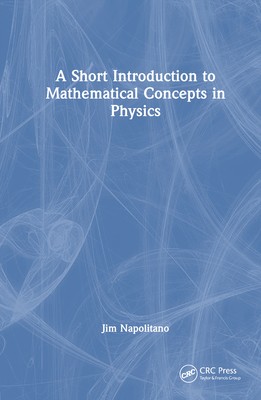
- We will send in 10–14 business days.
- Author: Jim Napolitano
- Publisher: CRC Press
- ISBN-10: 1032409770
- ISBN-13: 9781032409771
- Format: 15.6 x 23.4 x 1.4 cm, kieti viršeliai
- Language: English
- SAVE -10% with code: EXTRA
A Short Introduction to Mathematical Concepts in Physics (e-book) (used book) | bookbook.eu
Reviews
Description
Mathematics is the language of physics and yet, mathematics is an enormous subject. This textbook provides an accessible and concise introduction to mathematical physics for undergraduate students taking a one semester course.
It assumes the reader has studied a year of introductory physics and three semesters of basic calculus, including some vector calculus, but no formal training in differential equations or matrix algebra. It equips readers with the skills and foundational knowledge they need for courses that follow in classical mechanics, electromagnetism, quantum mechanics, and thermal physics.
This book exposes students early on to the kinds of mathematical manipulations they will need in upper-level courses in physics. It can also serve as a useful reference for their further studies.
Key features:
- Accompanied by homework problems and a solutions manual for instructors, available upon qualifying course adoption
- Bridges the gap between calculus and physics, explaining fundamental mathematics (differentiation, integration, infinite series) in physical terms
- Explores quick extensions into mathematics useful in physics, not typically taught in math courses, including the Gamma Function, hyperbolic functions, Gaussian integrals, Legendre polynomials, functions of a complex variable, and probability distribution functions
EXTRA 10 % discount with code: EXTRA
The promotion ends in 24d.01:45:07
The discount code is valid when purchasing from 10 €. Discounts do not stack.
- Author: Jim Napolitano
- Publisher: CRC Press
- ISBN-10: 1032409770
- ISBN-13: 9781032409771
- Format: 15.6 x 23.4 x 1.4 cm, kieti viršeliai
- Language: English English
Mathematics is the language of physics and yet, mathematics is an enormous subject. This textbook provides an accessible and concise introduction to mathematical physics for undergraduate students taking a one semester course.
It assumes the reader has studied a year of introductory physics and three semesters of basic calculus, including some vector calculus, but no formal training in differential equations or matrix algebra. It equips readers with the skills and foundational knowledge they need for courses that follow in classical mechanics, electromagnetism, quantum mechanics, and thermal physics.
This book exposes students early on to the kinds of mathematical manipulations they will need in upper-level courses in physics. It can also serve as a useful reference for their further studies.
Key features:
- Accompanied by homework problems and a solutions manual for instructors, available upon qualifying course adoption
- Bridges the gap between calculus and physics, explaining fundamental mathematics (differentiation, integration, infinite series) in physical terms
- Explores quick extensions into mathematics useful in physics, not typically taught in math courses, including the Gamma Function, hyperbolic functions, Gaussian integrals, Legendre polynomials, functions of a complex variable, and probability distribution functions


Reviews